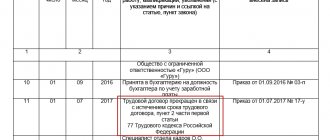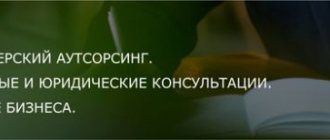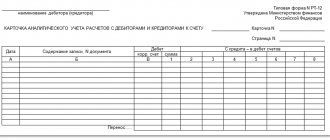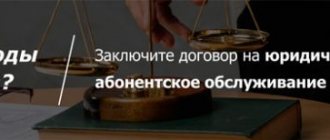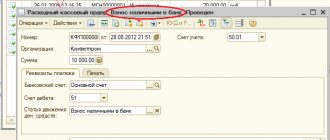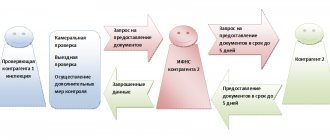An unscheduled inspection of the State Labor Inspectorate can be initiated based on a complaint from a company employee - both current and already dismissed. However, he can remain anonymous: inspectors will not tell the employer who exactly wrote the application. It is also worth understanding that even if the employee who filed the complaint decides to withdraw it, the initiated procedure will not be terminated.
The basis for a visit by inspectors to the employer may be the following violations mentioned in the employee’s appeal:
- Threat to life or health due to violation of working conditions and safety regulations.
- Failure to provide employees with personal protective equipment and cleaning supplies.
- Systematically occurring industrial accidents that remain uninvestigated.
- Inadequate condition of buildings, structures and equipment involved in the work.
- Disadvantages in the technological process.
- Non-payment of wages (delay) or non-issuance of pay slips.
- Non-payment of vacation pay or non-compliance with the vacation schedule.
- No salary indexation.
- Other violations of personnel labor rights.
The procedure for conducting an inspection by the labor inspectorate
The entire verification process consists of several stages:
- Alert . The inspectorate notifies the employer of a planned on-site or documentary inspection no later than three days in advance by sending him a copy of the inspection order against signature. For its part, the person being inspected has the right to request complete information about the authorities and their employees who will carry out the inspection, and regulations with a detailed procedure for control activities. Even about an unscheduled inspection, the entrepreneur must be warned by letter a day before it begins.
- Document verification, on-site inspection by the labor inspectorate . Typically, an inspection begins with a request for copies of documents of interest to the inspection, but it happens that an on-site inspection is carried out first. The inspector must begin work by presenting an individual identification card and an inspection order, which you previously received as a notification. Only the inspection carried out by the person specified in the order to conduct the inspection will be legal.
Maximum scan duration:
| What they check | Deadlines |
| Branches | 2 months |
| Small business | 50 hours |
| Microenterprises | 15 hours |
| Other enterprises | 20 days |
- Based on the results of the inspection, two copies of the report are drawn up . In rare cases, the report is drawn up immediately at the employer; most often, the person being inspected is called to the inspectorate to complete the documents.
- If the inspector finds violations (it’s sad, but this happens in most cases), he will issue an order containing:
- Description of the violation and date of its commission;
- Link to the relevant law;
- Deadlines for eliminating violations. If a repeat inspection shows that the violations have not been eliminated, the company faces administrative liability.
According to the law, the results of the inspection can be appealed.
Our advantages
- Profile on labor law. We know this area and understand how to effectively protect business interests.
- Expert status. Our team includes former GIT employees who know what to pay attention to.
- Work for results. We help you avoid fines or reduce their amount. If the amount of sanctions turns out to be higher than expected, we will take the payment ourselves.
- Affordable prices.
- Privacy and excellent service.
Contact us to get advice on passing unscheduled inspections!
Would you like to learn more about our services?
Leave a request and we will prepare a commercial offer!
Boundaries of what is permitted
What do labor inspectors have the right to do, and what actions are beyond the scope of their job descriptions?
The powers are specified in detail in Government Resolution No. 875, but here are the main ones:
- Check the employer at any time of the day. However, a prerequisite is the presence of a certificate and an order;
- Receive papers and data for verification, both from the employers themselves and from federal or territorial authorities;
- Take samples of substances for analysis. Only if the corresponding act is drawn up;
- Investigate accidents that may have been caused by violations of labor safety standards;
- Submit instructions to eliminate violations. Even the removal of certain persons from work. The employer has no right to refuse to fulfill them;
- In extreme cases, submit a demand to the court to terminate the company’s activities;
- Participate in litigation as an expert.
Please note that in 2021 inspections will take place in a new format, which was established by Government Decree No. 1080 of September 8, 2017. The powers and procedures of inspectors remain the same. The changes affected the audit results. Now they will be entered into checklists, which are grouped by topic. One sheet - one topic.
Take, for example, an employment contract. The inspector has the right to ask the employee whether he has entered into an employment contract with the company. If it turns out that it is not, and this is confirmed during the inspection, the contract was not presented by the company management upon request, a violation is entered into the checklist. All identified violations must be documented, so that later there are no disputes or disagreements with the results of the inspection.
In essence, checklists are a kind of questionnaire - a guide, according to which the inspector asks questions within the framework of a certain topic of the checklist, and upon receiving answers, requires them to be documented. A total of 132 checklists have been approved, but this does not mean that they will all be completed. In each specific case, the inspector, based on the company’s activities, decides independently which sheets to use and which not. What is noteworthy is that he does not have the right to check more than what is indicated in the checklists.
Inspectors cannot:
- Request information and samples that are not related to the object of inspection;
- Seize the originals of any documents.
Grounds for inspection by the labor inspectorate
Inspections by the labor inspectorate, like most other inspections, can be scheduled or unscheduled.
Any organization can be subject to a scheduled inspection by the labor inspectorate; more compelling reasons are needed for an unscheduled inspection.
So, the reason for an inspection can be:
- A scheduled inspection may be based on one of the following reasons:
- The employer registered or started doing business 3 years ago;
- The previous inspection ended 3 years ago.
According to the moratorium on inspections of small businesses in Russia, until the end of 2021, enterprises covered by the law were exempt from scheduled inspections by the labor inspectorate. Currently, the Ministry of Economic Development and the Prosecutor General, on behalf of the Government, are developing amendments to the legislation providing for the extension of this moratorium until 2022.
The inspection schedule for 2021 has already been presented on the website of the Prosecutor General's Office.
- The impetus for an unscheduled inspection (there are no restrictions on the frequency of such inspections by law) can be:
- Expiration of the deadline for fulfilling the order from the last inspection;
- Issue of an order based on instructions from the prosecutor's office;
- Delay by the employer of wages, as well as payment of them not in full;
- Payroll below the minimum required by law;
- Violation of the Labor Code of the Russian Federation, causing a threat to the health of employees;
- Receipt of complaints from employees about violation of their rights specified in the Labor Code of the Russian Federation or requests to check working conditions (the inspectorate does not consider anonymous requests, but it must act confidentially, without advertising whose complaint the inspection was organized for).
Rights and obligations of inspectors and employers
During an unscheduled inspection, labor inspectors and employers have certain rights and obligations (Articles 12 and 15 of the Labor Inspection Convention of July 11, 1947 No. 81, Articles 357 and 358 of the Labor Code of the Russian Federation, Articles 21 and 25 of the Law of December 26 2008 No. 294-FZ).
Please note that the labor inspector cannot conduct an unscheduled on-site inspection during the absence of the head of the organization (other authorized representative of the employer). The exception is when there are facts:
- causing harm to the life and health of citizens;
- threats to state security;
- occurrence of natural and man-made emergencies, etc.
This follows from the provisions of paragraph 2 of Article 15 and subparagraph “b” of paragraph 2 of part 2 of Article 10 of the Law of December 26, 2008 No. 294-FZ.
At the same time, access of labor inspectors to organizations subordinate to the bodies of defense, security, internal affairs, execution of punishments and bodies governing the use of atomic energy is carried out in the manner determined by these bodies in agreement with the Federal Service for Labor and Employment.
Access to the specified organizations is suspended for the following periods:
- maneuvers or exercises;
- conducting a counter-terrorism operation;
- liquidation of consequences of accidents, natural and man-made disasters;
- other emergency situations.
Such rules are established by subparagraphs “b” and “c” of paragraph 11 of the Regulations, approved by Decree of the Government of the Russian Federation of September 1, 2012 No. 875.
What does the labor inspectorate check?
Compliance with any labor legislation at the enterprise is subject to verification.
The labor inspector has the right to request (and you will be required to provide) the following documents:
- Employment contracts, personal cards of employees and other data about them;
- Work books of employees at the enterprise and their accounting log;
- Work schedule and time sheet for hours worked;
- Sick leave certificates, documents on medical examinations of employees;
- Vacation schedule, as well as other documents related to it (employee statements);
- Calculation sheets;
- Accounting statements, individual employee accounts and other information about employee payments;
- Company charter and internal regulations;
- Registration of work with citizens of other states and beneficiaries;
- Regulations on wages, bonuses, and personal data of employees;
- Evidence (personal signatures) that all employees are familiar with the above documents.
The exact list of documents for inspection by the labor inspectorate depends on the basis for its conduct.
An employee’s complaint as a basis for unscheduled control
Employee complaints are the most common reason for unscheduled HIT inspections. Employers should know the following:
- Art. 360 of the Labor Code of the Russian Federation does not directly provide for a complaint from a former employee as a basis for inspection. But the code does not know such a thing as a “former employee” at all, and does not separate the rights of current and former employees to protect their interests. Therefore, an inspection carried out at the request of a dismissed employee is legitimate.
- If the employee who filed the complaint wished to remain anonymous, GIT inspectors do not have the right to familiarize the employer with its contents, or provide the person’s full name. this employee (Part 2 of Article 358 of the Labor Code of the Russian Federation). At the same time, inspectors are obliged to report on the subject, goals and objectives of the inspection, and its basis.
- An employee’s withdrawal of a complaint is not grounds for termination of an inspection (if at the time of filing there was a violation of his rights), since labor relations are of a private-public nature. Prompt elimination of violations by the employer may be taken into account when imposing an administrative penalty as a mitigating circumstance.
How to prepare for a labor inspection inspection
The most common violation that entails a fine for the employer is the lack of all necessary documents.
Local acts are mandatory for every organization, even the smallest one, with hired employees. For example, this is a set of internal regulations, regulations on personal data of employees.
It is also mandatory to issue a payslip (payment via bank transfer is no exception) - they do not have to be issued against signature, but employees should be aware of their right to know the payment made for the month. If desired, the employer has a way to insure itself by maintaining a log of the issuance of pay slips.
The employer must keep work books for all employees in a safe.
Employers often make inaccuracies in the preparation of basic documents. For example:
- The employment contract does not specify the wage rate;
- The copy of the employment contract (any other document) belonging to the employer does not bear the employee’s signature;
- The vacation schedule was signed later than 14 days before the start of the calendar year.
In addition to documents, you should also take care of compliance with all labor law standards. Timely certification and safety of employees in their workplace are very important. Whether workers need special clothing or accessories, protective masks or gloves, and much more depends on the type of work they perform.
Other common mistakes:
- Annual leave is divided into small parts, and none of them reaches 14 days;
- Salary is below the minimum wage;
- The salary amount is not indicated in Russian rubles;
- Salaries are paid less than once every 15 days, and there is no written consent of the employee to such a payment schedule;
- Hiring foreign citizens under a fixed-term contract before the expiration of the work permit. To avoid administrative liability with foreign citizens, it is better to enter into standard open-ended contracts.
The legislative framework
Employers are required to comply with labor law standards. The state checks from time to time how this duty is fulfilled. In practice, if a company of any form of ownership has at least one person on its staff, the labor inspectorate will come there: planned, and sometimes unscheduled.
What do labor inspectors check? The main purpose of inspections is to monitor compliance by entrepreneurs and officials with labor legislation. The procedure and standards for this control are regulated at the legislative level. In particular, articles from Chapter 57 of the Labor Code are devoted to this.
| Articles about inspections |
|
Legislative acts that control the implementation of labor law standards:
- Federal Law No. 294 of December 26, 2008 is aimed at protecting legal entities and individual entrepreneurs during inspections. It regulates the state supervision procedure, sets deadlines, and contains other important information for entrepreneurs.
- Government Decree No. 875 of September 1, 2012 approves the Regulations on state supervision in the field of labor law.
| Valentina Mitrofanova will tell you what's new in labor legislation this week. Watch the new episode of Personnel Review. |
Fines from the labor inspectorate
If the labor inspector reveals violations, then first of all the employer will be given an order. Failure to eliminate all points of the order may result in suspension of activities or a fine.
Depending on the violation, a fine may be imposed on the company itself, its director, individual entrepreneur, or responsible persons (this may be the head of the personnel department or the chief accountant), if this is provided for by the company’s rules.
The most common fines issued by the labor inspectorate in 2021:
| Violation | Fine for an official | Fine for individual entrepreneurs | Fine for a legal entity | |
| Violation of labor laws | 1,000 - 5,000 rubles | 30,000 - 50,000 rubles | ||
| Repeated violation of labor laws | 10,000 - 20,000 rubles or disqualification for up to three years | 5,000 - 10,000 rubles | 50,000 - 100,000 rubles | |
| Admission to work of an employee who does not have the right to do so (for example, without a health certificate), while the employee denies this. | 10,000 - 20,000 rubles for the employer and 3,000 - 5,000 for the employee | |||
| Evasion of concluding an employment contract with an employee or its incorrect execution | 10,000 - 20,000 rubles | 5,000 - 10,000 rubles | 50,000 - 100,000 rubles | |
| Repeated evasion of concluding an employment contract, deliberately incorrect execution of it, or re-admission to work of an employee who does not have the right to do so | Disqualification for up to three years | 30,000 - 40,000 rubles | 100,000 - 200,000 rubles | |
| Violation of labor protection requirements | 2,000 - 5,000 rubles | 50,000 - 80,000 rubles | ||
| Repeated violation of labor protection | 30,000 - 40,000 rubles or disqualification for up to three years | 100,000 - 200,000 rubles or termination of activity for up to three months | ||
| Violation of special inspection requirements | 5,000 - 10,000 rubles | 60,000 - 80,000 rubles | ||
| Permission to work for an employee who has not undergone labor safety training | 15,000 - 25,000 rubles | 60,000 - 80,000 rubles | ||
| Failure to provide employees with personal protective equipment (when required) | 25,000 - 30,000 rubles | 130,000 - 150,000 rubles | ||
results
Depending on the violations identified, based on the results of the inspection, the State Tax Inspectorate employee may issue the following types of documents :
- Act;
- Order to eliminate violations;
- Decision on administrative punishment;
- Protocol on administrative punishment.
An inspection report is issued if minor or no violations are found. This document is drawn up in two copies, one of which is issued to the head of the inspected institution (his authorized person), the other remains with the inspector.
An order is written if violations are identified. It is written on the basis of an act. It indicates specific violations and deadlines for their elimination.
In the order, all listed violations must be accompanied by references to the rules of law that were violated.
A protocol on an administrative violation is issued when there are sufficient grounds to initiate a case. According to Art. 28.5 of the Code of Administrative Offenses of the Russian Federation, the protocol must be issued immediately or within 2 days (time to clarify all the circumstances).
The decision on administrative punishment is written on the basis of the protocol after consideration of all the circumstances of the case, but no later than a year after the violation was committed.
If violations are detected, the following outcomes may occur:
- An order is written;
- A fine is issued;
- The activities of the organization are suspended;
- Employees who are not suitable for their positions are forcibly dismissed;
- The inspection materials are sent to the prosecutor's office to initiate a criminal case.
However, when conducting an inspection, inspectors may exceed their authority or make an erroneous decision. If the employer does not agree with the results of the inspection, he has the right to challenge them.

